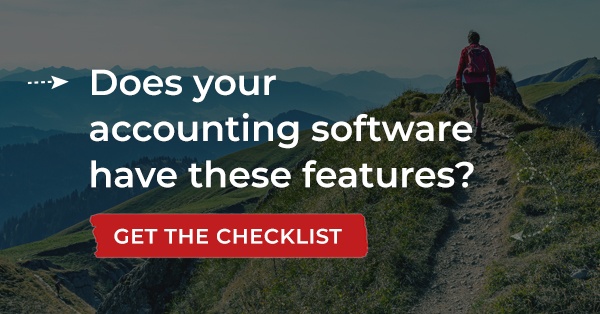How CFOs can save money on cloud accounting software

Whether it was the need to enable your multi-entity company to work from anywhere, a desire to avoid expensive maintenance and upgrade fees, or a combination of both, you’ve decided to invest in cloud accounting software. It’s a smart choice thousands are making, contributing to a cloud accounting software market that was valued at approximately $5.39 billion in 2025, with projections to reach $7.75 billion by 2029, reflecting a compound annual growth rate (CAGR) of 9.5%.
Now you have the task of budgeting for your investment and finding the most cost-effective solution to support your growing multi-entity company.
What does cloud accounting software cost?
A major challenge when searching for cloud accounting software is that solutions vary significantly in terms of price and functionality. When it comes to multi-entity accounting software, the price range can vary even more depending on the features needed to manage multiple entities efficiently.
The price of cloud accounting software varies widely, with basic plans typically starting around $25 per month for small businesses, and can increase significantly for more advanced or enterprise-level solutions. However, the price a vendor advertises often doesn’t include additional costs for add-ons, integrations, or support, which can significantly affect the total cost.
Often, you may see accounting software marketed as being in the cloud but really it is a variation of an older on-premise system hosted in a data center. That might sound like a great deal until you realize data hosting isn’t included, you still have to pay recurring maintenance fees, and most likely, consultants to do the upgrades. You’ll need to consider any potential hidden costs, such as data hosting fees, in your cloud accounting software budget.
Other hidden fees in cloud accounting software solutions might include the cost of paying independent software vendors (ISVs) for integrations such as billing and data analytics or the cost of implementation and training.
If your company is growing fast, especially with multiple entities, you also need to consider the cost of adding new users. Some companies have standard pricing tiers that don’t allow you to easily add new users and instead force you to upgrade to a much more costly package that’s more than you need.
Follow these four recommendations to find cloud accounting software that is both cost-effective and robust enough to support your needs as you grow.
What are the best cloud accounting software budgeting strategies for multi-entity businesses?
1. Assess your current needs
Take a close look at your company’s accounting practices. How often do you compile financial reports? Who receives those reports? Do they need full access to the software, or just need access to one module?
What are the non-negotiables — the features your accounting software must have for your finance team to do its job properly?
What other capabilities do you wish you had now that could increase productivity or help your team gain deeper insights into your company's performance?
Keep in mind that a solution with a lower monthly cost won’t actually save you money if you have to hire additional employees to manage invoices or spend several days each month compiling consolidated reports for multiple entities.
At the same time, an overly complex enterprise resource planning (ERP) system that only a few people understand how to use can be just as limiting. You will likely need to hire a consulting team to implement it and hire employees with a highly specialized skill set to manage it.
2. Forecast your future needs
While it's impossible to see into the future with total clarity, you should be able to forecast your company’s growth over the next few years and factor that into your cloud accounting software budget.
How many new locations or entities do you expect to add in the next three years? Do you plan to enter a new market or increase private equity investments?
Is your company impacted by seasonal changes, such as needing to hire a large number of temporary employees? Is your leadership looking into any major moves, such as going public, that would change its financial reporting requirements?
Flexibility should be a key consideration in your search for cloud accounting software. You don't want to pay a premium for a solution solely because it allows dozens of users when implementing more automated workflows would be more efficient and cost-effective.
A cloud accounting software that allows you to pay per user may be a better choice, especially for multi-entity businesses that need scalable solutions as they grow.
3. Understand the true cost
Not all cloud accounting software vendors are transparent about price. As you evaluate your options, make sure you ask the right questions, including:
Is the system you're considering a true cloud accounting software, or will there be an extra cost to host your data in a data center?
- Does the solution include all maintenance and upgrades?
- Will you need to pay other software vendors for integrations?
- Can you add or subtract users or add-on features before the contract period ends?
- Is there an additional cost for setup, implementation, and data conversion?
- Is training included, or will you need to hire a consultant to help your team learn the new system?
- Is ongoing support included?
Your IT team should also consider the vendor's security practices. More than half of organizations have experienced a data breach caused by a third-party vendor. According to the 2024 report from Statista, the average cost of a data breach rose to $4.88 million, marking a 10% increase—the highest spike since the pandemic.
4. Don’t forget to ask about discounts
Some software vendors offer discounts on per-user fees after a certain number of users. Others may provide discounts if you purchase their solution through a value-added reseller or partner, or if you already use another system that integrates with theirs.
It’s also worth asking if your organization is eligible for discounts as a nonprofit.
Gravity Software can help you save on cloud accounting software
With Gravity Software, you can manage accounting, investments, inventory, and purchasing exactly the way your company operates. You can also enhance your system with advanced features like AP Automation, Direct ACH, fixed assets, Payment Portal, revenue recognition, and subscriptions. Gravity offers flexibility with discounts for additional users, including the option to add “read-only” and "module" users at reduced rates, so you only pay for what you need.
Gravity Software is built on the Microsoft Power Platform, which enables seamless integration with Microsoft tools such as Teams, Outlook, and SharePoint. This allows you to create personalized workflows, add fields, and generate reports that help you make better decisions for your growing business.
In addition to core financial management, Gravity Software helps businesses streamline operational processes. The platform enables real-time updates and automation of tasks like intercompany transactions and billing, saving time and reducing the risk of manual data entry errors. Gravity’s Power Automate integration simplifies workflows, allowing for automated journal entries and updates without needing manual intervention.
Customer testimonial
"Tracking renovations at the hotels or our other facilities was done on spreadsheets and was very time-consuming. With Gravity’s job costing software, we can easily track the estimated and actual costs. When we enter an accounts payable voucher, we can easily tag it to the job and work type, avoiding double entry and saving time. Now we can quickly see if we are under or over budget on our renovations.”
— Stephanie Welborn, Accounts Payable Administrator, Sunray Companies
"With 47 entities across multiple locations, Gravity Software’s ability to manage intercompany transactions has been a game changer for us."
Ready to streamline your multi-entity accounting?
If you're looking for a cost-effective and scalable accounting solution, Gravity Software is here to help. With seamless integrations, advanced features, and the flexibility to grow with your business, it’s the ideal choice for businesses of all sizes.
Schedule a demo today to see how Gravity Software can help you simplify your accounting and save money!
Gravity Software
Better. Smarter. Accounting.



